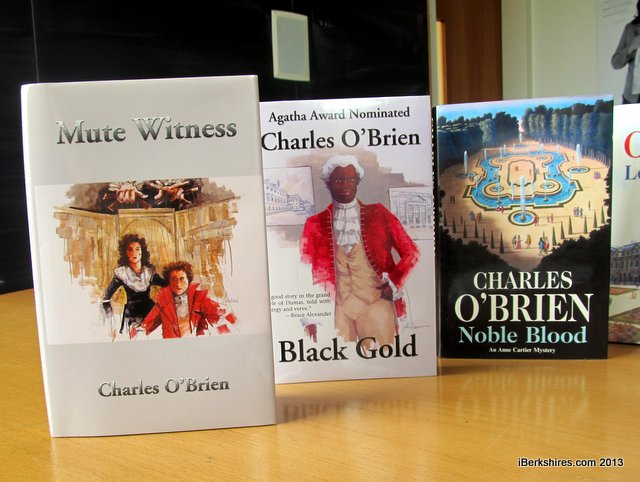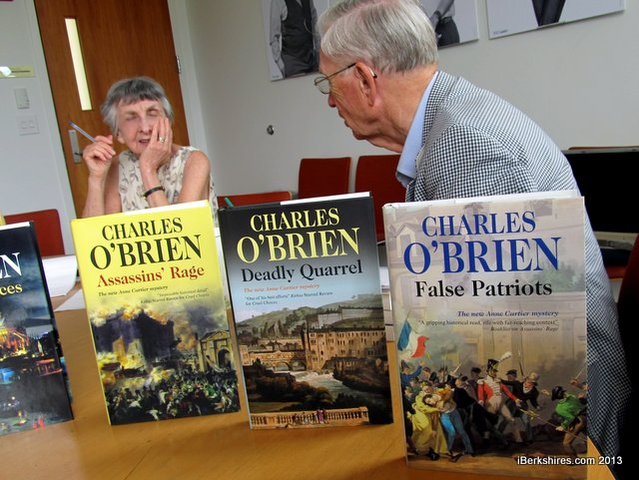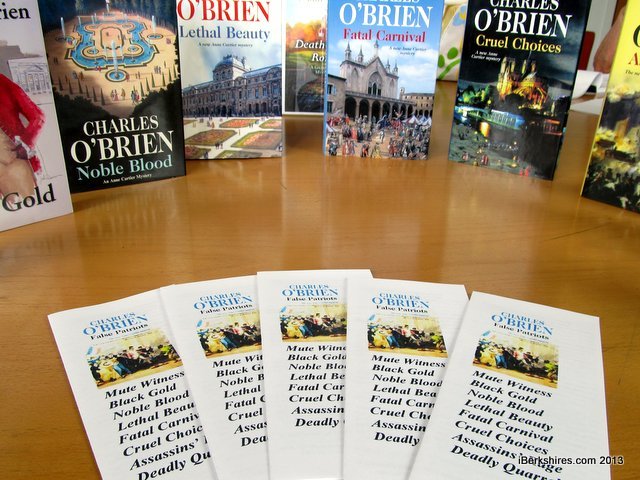Q&A: Local Author Mixes Love of History With Mystery
 Charles O'Brien holds his newest historical mystery, 'Death of a Robber Baron,' set partially in a Gilded Age 'Berkshire Cottage.' Charles O'Brien holds his newest historical mystery, 'Death of a Robber Baron,' set partially in a Gilded Age 'Berkshire Cottage.' |
WILLIAMSTOWN, Mass. — After writing nine historical mysteries in the Anne Cartier Series, set in 18th century France and England, mystery writer Charles O'Brien has shifted to Gilded Age America with the just published "Death of a Robber Baron."
The first of a trilogy, "Death of a Robber Baron" takes place in 1893 in the Berkshires and New York and features a new sleuth, Pamela Thompson.
When O'Brien's mother gave him a classic novel to read at the age of 9, neither of them had an inkling of how it would affect his future.
"In third grade, I was having trouble reading and my teacher told my mother 'Give him something he'd be interested in,' " O'Brien recalled these many years later. "'Mother gave me 'Knights of the Round Table,' and from that point on I found historical novels fascinating."
That love of history motivated O'Brien to pursue a master's degree in American history at Notre Dame University and a doctorate in Western European history from Columbia University. He went on to teach history in several institutions of higher learning, including Skidmore College in Saratoga Springs, N.Y., and Western Illinois University in Macomb.
When he retired from classroom teaching in 1994, he embraced a new career: writing historical mysteries.
The Williamstown resident sat down with iBerkshires last month to answer questions about his life as an author.
Question: Why did you choose writing as a second career?
Answer: It was part of a transition from classroom teaching into retirement. The four years before I retired in 1994 from teaching at Western Illinois University, I started planning what to do with the rest of my life. I wanted to be concerned with history and needed something outside the classroom.
I commuted from Williamstown to Macomb for six years before my retirement — we had bought a house in Williamstown where my wife, (art historian) Elvy, had a job — and on a flight to Quad City Airport, I noticed my fellow passengers reading mystery novels, mostly John Grisham, and thought of writing historical mysteries. My interest in crime had grown as a result of a course I was asked to teach at WIU, "Crime and Police." So as retirement approached, I tapped into that course and laid out a plan to write historical mysteries set in the period I was teaching, the 18th century in France.
Q: How did you prepare to write fiction?
A: I needed to retool from an academic approach to history to a more imaginative one. So I engaged a colleague in the English Department to teach me creative writing.
Q: How long did it take to complete your first story "Mute Witness?"
A: By the end of the year I trained with my colleague, I had written a rough draft of "Mute Witness," the first book in the Anne Cartier series. Back home in Williamstown, I worked on that draft over the next five years. About 1998, I thought I had a manuscript and began looking for an agent. I approached 42 of them unsuccessfully.
Q: How did you get a publisher to look at your work without an agent representing you?
 O'Brien began his second career with 'Mute Witness,' after taking a creative writing course and dipping into his expertise on Europe at the time of the French Revolution. O'Brien began his second career with 'Mute Witness,' after taking a creative writing course and dipping into his expertise on Europe at the time of the French Revolution. |
A: Around 1999, Elvy and I attended a Bouchercon mystery conference named in honor of Anthony Boucher, the distinguished mystery fiction critic, editor and author. At the conference, Elvy called my attention to Poisoned Pen Press's display of historical mystery books. I approached the editor and he said to send my manuscript to them. They published "Mute Witness" in 2001. Well received, it launched a series of nine books.
Q: After writing the Anne Cartier Series, how long did you wait to begin working on "Death of a Robber Baron"?
A: In search of a new setting, I looked back at my early work in American history, in particular the period from our country's Reconstruction following the Civil War up to the Progressive Era, about 1900. My master's thesis on the early social and economic views of Oliver Wendell Holmes Jr. led me to the 1890s, a decade of crisis and change. I immediately began research and conceived the plan for "Death of a Robber Baron." Soon afterward, I started writing.
Q: Are characters in your mysteries based on real people?
A: I used the historical Kate Warne as a model for Pamela Thompson, the chief protagonist in "Death of a Robber Baron." Warne was a young widow whom Allen Pinkerton hired as a secretary, but she told him, 'I can do more than that,' and became an investigator. She worked for Pinkerton for 10 years.
I like to work on a woman (protagonist) in that role. It's a challenge because they did not get into professional investigative work until the late 1890s. For "Death," I also wanted a male sleuth who could do what a woman investigator couldn't do in that era. I created Jeremiah Prescott. He is 50 and Pamela is 40. He's a Civil War veteran suffering from posttraumatic disorder, then known as battle fatigue. William Clark, nicknamed Copper King, was the inspiration for the character Henry Jennings — the Robber Baron. All the characters live in the context of their times. I do not contradict historical facts.
Q: Do you keep to a schedule when writing?
A: I do routine housework first thing — make the breakfast, pick the raspberries, empty dehumidifier. (His wife interjects at this point that "He bakes, too!)
Around 9 a.m., I sit down at the computer and usually go over what I wrote the night before, make corrections and I also see if I have to do more research. I might do research after lunch. My best creative period is 7 p.m. to 9 p.m. I usually write 300 or 500 words a day. Around 9 o'clock, my wife and I play Scrabble. It's a good way to turn my mind away from stories."
Q: Did you have any writing mentors?
A: At the beginning of my writing career, I learned from Miriam Grace Monfredo. She wrote a series about a 19th-century American female librarian who privately investigated crimes. Probably in early 1990s I read five of her books. I liked that she introduced issues from social history, for instance, women's property rights. When my Anne Cartier discusses marriage with Count Paul de Saint-Martin, she persuades him to treat her as his equal, even in questions concerning property. In "Death of a Robber Baron," Pamela Thompson likewise insists on being consulted in major decisions concerning the family's finances.
Q: What do you want readers to take away from your stories?
A: I try not to preach. The consequences of greed, pride and the other deadly sins occur naturally in the lives of the people I'm creating.
Q: What is the most difficult aspect of the writing process?
A: The first draft, because I am developing the characters as I go along and creating a plot as realistically as I can while trying to avoid tangents. I try not to be a perfectionist with the first draft, because I know I will be going back to edit it. You have to have a degree of trust in your creative process. As you go along, solutions will come and a lot of pleasure as well.
Q: Do you work from an outline?
A: I have a brief concept or sketch of what I think might be a good topic for a book. I start with a setting.
Q: Do you know from the time you begin working on a book who will be murdered?
A: I know who is going to be the principal sleuth and who will likely be murdered. My books have many characters. I'm trying to create a world — an atmosphere to take the reader into a new experience. I have to find price of common things to put reader back in historical time. In the period of "Death of a Robber Baron," it cost $4 a night to stay at the Curtis Hotel in Lenox in high season. Now to stay a night in a comparable hotel, it would cost $400.
Q: Can you give us a taste of "Death of a Robber Baron" in a quote:
A: This one has a taste of Pamela (Thompson). Jeremiah Prescott has asked his assistant, Harry Miller, to train Pamela Thompson to be a private investigator for the law firm. Harry is skeptical and warns Pamela, "In the future the two of us might have to work together. I want a partner who I can depend on. A society lady would faint at the first whiff of danger and be worse than useless."
"Sir!" Pamela exclaimed. "I may speak correct English, but I'm not one of your 'society ladies.' Nor do I faint in the face of danger. Less than a month ago, I fought off a fierce assailant. He fled, screaming."
O'Brien participates in a writer's roundtable with area writers Karen Shepard and Andrea Barrett at the North Adams Public Library on Thursday, Sept. 12, at 6 p.m. and reads from his new book at Water Street Books in Williamstown on Friday, Sept. 27, at 7 p.m.
Tags: authors, books, Q&A,

















